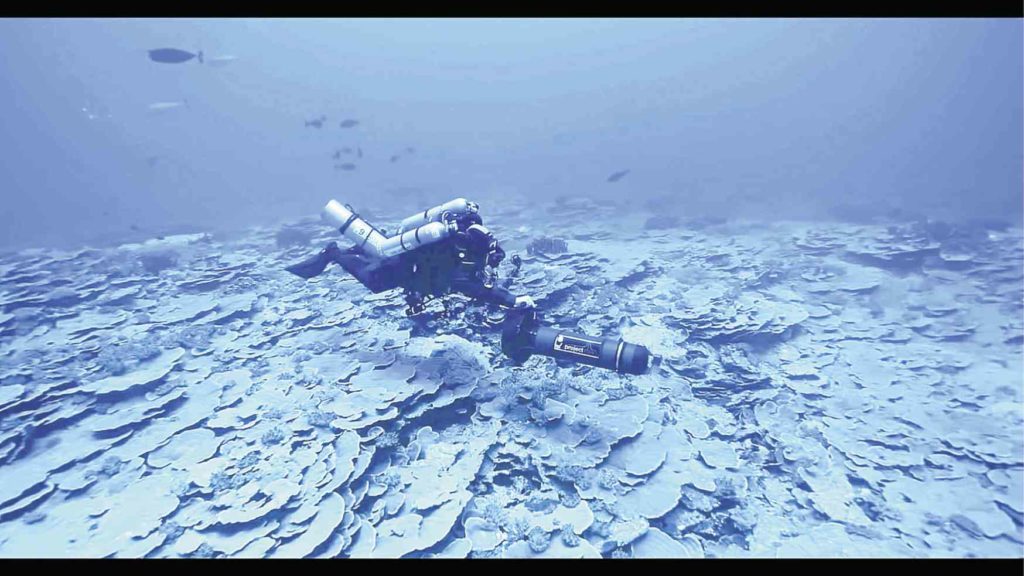
SCIENTIFIC RESEARCH A diver explores the seabed of Benham Rise believed to be rich in marine resources and underwater minerals. —INQUIRER PHOTO
The Philippine government objects to China naming some undersea features in Philippine Rise, a vast offshore region where the country has undisputed sovereign rights, Malacañang said on Wednesday.
“We object and do not recognize the Chinese names given to some undersea features in Philippine Rise,” presidential spokesperson Harry Roque said.
The Philippines has already raised its concern to China over its naming of the undersea features in Philippine Rise and may officially notify an international ocean mapping agency under the United Nations that lists such maritime records, Roque said.
Formerly known as Benham Rise, Philippine Rise is a 13-million-hectare undersea plateau off Aurora province, on the northeastern side of the Philippine archipelago, that the United Nations recognized in 2012 as part of the country’s continental shelf.
‘Discovered’ by China
On Monday, Jay Batongbacal, director of the University of the Philippines’ Institute for Maritime Affairs and Law of the Sea, disclosed that the International Hydrographic Organization (IHO) approved the names proposed by China in 2017.
In a post on Facebook, Batongbacal said the five features named by China were reported to have been “discovered” during a 2004 survey by the Li Shiguang Hao of the People’s Liberation Army Navy’s hydrographic office. Three were submitted to IHO for consideration in 2014.
He said two of the features were discovered by the vessel during the same survey but the proposed names were submitted by the China Ocean Minerals R&D Association in 2016.
He said the features that China named were Jinghao and Tianbao Seamounts, located 130 km east of Cagayan province; Haidongquing Seamount, farther east at 353 km, and Cuiqiao Hill and Jujiu Seamount, which form the central peaks of the Philippine Rise undersea province.
Batongbacal said all these features were within the Philippines’ 370-kilometer exclusive economic zone (EEZ), not just in the region of the country’s extended continental shelf.
He warned that more name proposals for other features in Philippine Rise could be expected from China.
It could not be immediately determined whether the Chinese survey had permission from the Philippine government.
Philippines’ ‘concerns’
Roque said the Philippine Embassy in Beijing had informed him that it had raised to Chinese officials the Philippines’ concerns about China’s naming the Philippine Rise features.
The embassy is also considering sending an official notification of its objection to the chair of the Subcommittee on Undersea Feature Names of the IHO-Intergovernmental Oceanographic Commission General Bathymetric Chart of the Oceans, he said.
He said the Philippines was not a part of the 12-member subcommittee.
China’s proposal to rename undersea features in the Philippines was submitted to the subcommittee during its meetings in Brazil in October 2015 and in September 2017, he said.
In Beijing, a Chinese foreign ministry spokesperson said on Wednesday that China has been participating in activities related to proposing names for undersea features “in accordance with international practice” and the rules of the IHO.
Be objective
“China respects the Philippines’ continental shelf rights to [Philippine] Rise. Meanwhile, we hope the relevant parties can be objective and responsible in viewing relevant technical work,” Geng Shuang, the spokesperson, said.
Batongbacal said the IHO had its own protocol when accepting and approving names. He said the Philippine government probably did not object to China’s proposal to name the features at the time.
“Alternatively, the ‘discoveries’ are based on hydrographic surveys by [China’s] navy. [China] prohibits both hydrographic surveys and [marine scientific research] within its EEZ without its consent. So why do they do it to others? It’s a double standard,” he said.
Senators JV Ejercito, Panfilo Lacson and Antonio Trillanes IV said the government should file a diplomatic protest with China.
“[C]learly, [Philippine] Rise is ours,” Lacson told reporters.
He said the public was apprehensive that since China named some features in Philippine Rise, it was “not far-fetched” that China would claim the rise as part of its territory and build artificial islands and structures there, just like what it was doing in the South China Sea.
“We shouldn’t be too accommodating [to China],” Lacson said, adding that Foreign Secretary Alan Peter Cayetano should “settle this issue with China” and that the government “should pursue, not just give lip service,” to the matter.
Trillanes said China’s move warranted a diplomatic protest because the government could not ignore it.
Experts have said that claims could be made by discovery, he said, and if China says it is the one that researched the Philippine Rise features, then it will try to find “holes” in international conventions.
“So we need to be on guard here,” he said.
Ejercito said the government should file a diplomatic protest because it was its “sworn duty to fight for and protect our sovereignty and protect our territorial integrity.”
Sen. Win Gatchalian said the Philippines should clarify with the United Nations the effect of China’s naming the Philippine Rise features.
China research
Critics have questioned why the Duterte administration allowed China to undertake scientific research in Philippine Rise given Manila’s long-standing territorial conflict with Beijing in the South China Sea, on the western side of the archipelago.
President Duterte ordered an end last week to all foreign scientific research missions in Philippine Rise after officials said the Philippines’ undisputed sovereign rights in the potentially oil- and gas-endowed body of water came under question.
Mr. Duterte followed up with a warning that he would order the Philippine Navy to fire if other countries extracted resources from the rise, which lies within the Philippines’ EEZ recognized under the United Nations Convention on the Law of the Sea.
Foreign ships can pass but cannot fish or extract oil and gas from under the seabed, he said. —With reports from Christine O. Avendaño and AP

